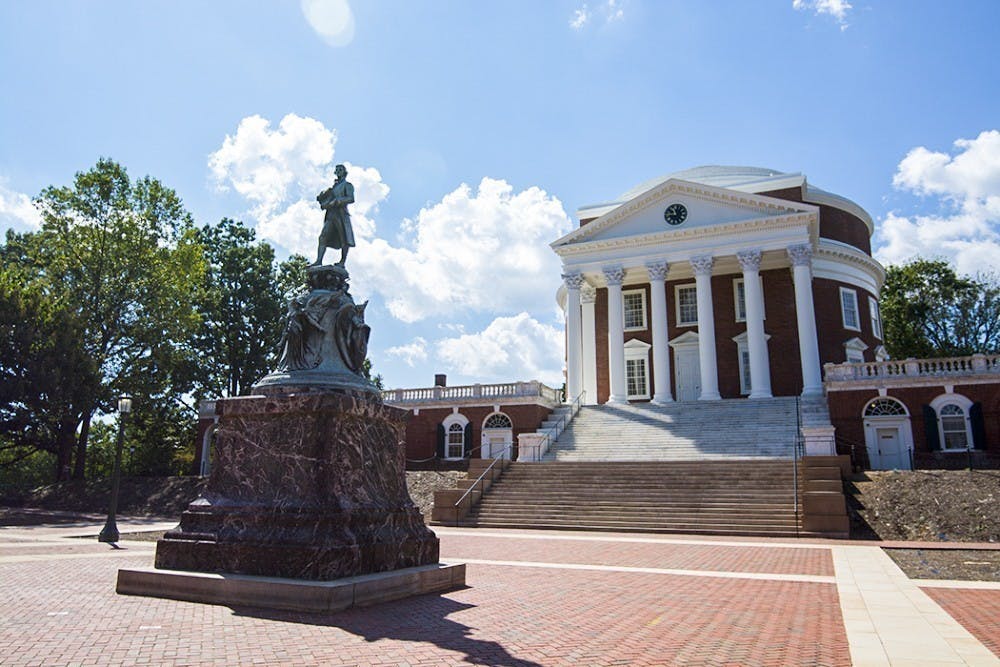Following the release of regular decision offers for the Class of 2025 on March 25, prospective students were given until May 1 to accept their offers. Before that deadline, students had many opportunities to further explore the University, including attending Virtual Days on the Lawn. Virtual Days on the Lawn is an annual event — though typically held in person — that allows students to learn more about the University through University Guide Service tours, chatting with current students and accessing logistical resources. It seems as if Virtual Days on the Lawn is the perfect way for a student to decide if they want to attend the University. However, Virtual Days on the Lawn fails to provide substantial information on the history of the University — which is integral when making such an important decision.
In the “Discover UVA” section of the admissions website, the University is painted as a beautiful place where students can thrive both academically and socially. When discussing what life is like in Charlottesville, the page dotingly describes the city’s closeness to the Blue Ridge mountains as well as access to an abundance of outdoor activities and local entertainment. Nowhere on the webpage is there mention of Charlottesville’s history — as the University was created by the hands of enslaved laborers. The only acknowledgment on the page is tucked away in a brief three-second clip of the Memorial to Enslaved Laborers in the 2019-2020 Year in Review video.
The admissions website does however have a resource link for the Monacan Nation — the University was built on their tribal land — under an “Indigenous/UVA Relating” section. As necessary as this page is, it cannot be viewed because the link itself is broken.
The lack of information about the University’s history on the admissions website is extremely disappointing. It is the responsibility of this office to provide prospective students with the full picture of life at the University — that should include the good and the bad. The erection of the Memorial to Enslaved Laborers is a starting point for openly recognizing its racist past, but it is not enough.
Thomas Jefferson, the founder of the University, was a white man who dominated the social and political realms during his time. While he believed in the educational liberties of the white man, he also believed in the oppressive actions towards his Black counterpart. Jefferson exploited enslaved laborers by using them to build and maintain the University. While we see the gardens and serpentine walls of the University today as a breathtaking sight of nature and architecture, in the 1800s they were used to hide enslaved laborers as they were forced to work tirelessly for the school.
Story upon story of racist acts are found in the University’s history. White men, students and professors alike regularly inflicted violence on enslaved laborers with little to no consequence, as white supremacy dominated society throughout the 19th century. Corks and Curls, the University’s former yearbook, encapsulates the racist culture present during the 20th century. Numerous depictions of blackface are scattered throughout the volumes — one example being U.Va.’s Glee Club in 1917. While this is despicable as is, the lack of recognition U.Va. gives these acts makes matters even worse. Information on such events is hidden, looked over and forgotten by U.Va. administration.
Jefferson created a place which fostered Southern ideals — yet today his racism is hardly shared with the public. Any incoming student, or any student period, looking to learn about U.Va.’s history must undergo hefty web searches to discover the information themselves. Minstrelsy, blackface and eugenics practices used to be common occurrences in U.Va. life.
While U.Va. no longer participates in the explicit racist behavior that it once did, it participates in the neglect of such behavior. It is sad to think that despite living in such a progressive society today, U.Va. still is submissive in the face of racism. It is the job of the University to consciously recognize and share its racist past with the public. Incoming students, and anyone curious about the University, deserve to know how things once operated here. Providing historical context to prospective students not only shows the public that the University genuinely cares about racial equality, it also allows students to have a more complete understanding of where they will spend the next four years. Anyone who calls U.Va. home has the right to know how this home came to fruition. Failing to properly educate prospective students only creates a racistly compliant atmosphere, one which affects not only the University but society as a whole.
This is a call for University President Ryan, the Admissions staff and all other U.Va. leaders to make a change. By providing additional online resources on U.Va.’s past, and adding more equity-centered events to Virtual Days on the Lawn, we as a community can begin to understand our origins. We are not perfect, and we cannot change the past. But when we start openly acknowledging the racism built into the foundations of this great institution, we can move forward in unity, empathy and excellence.
Grace Duregger is a Viewpoint Writer for The Cavalier Daily. She can be reached at opinion@cavalierdaily.com.
The opinions expressed in this column are not necessarily those of The Cavalier Daily. Columns represent the views of the authors alone.





